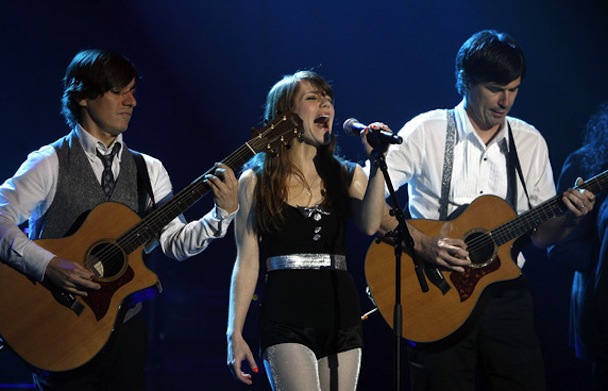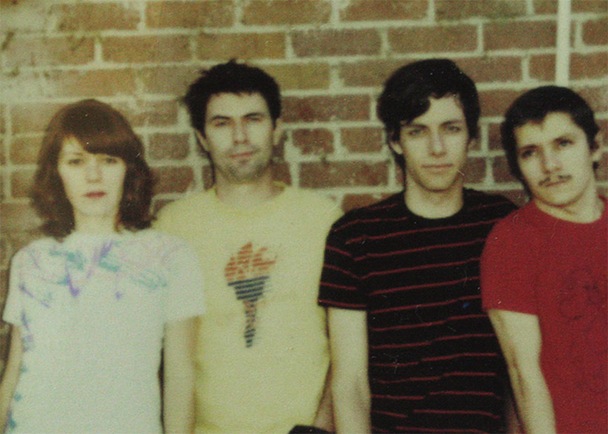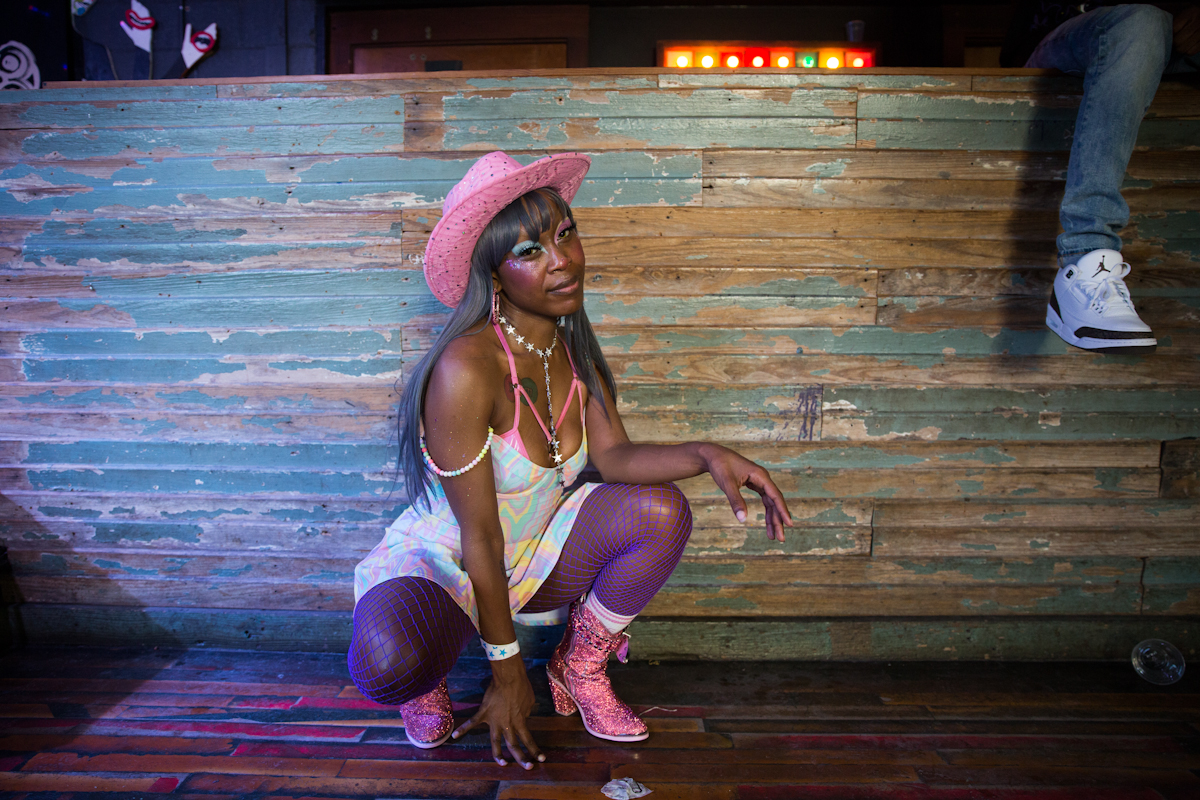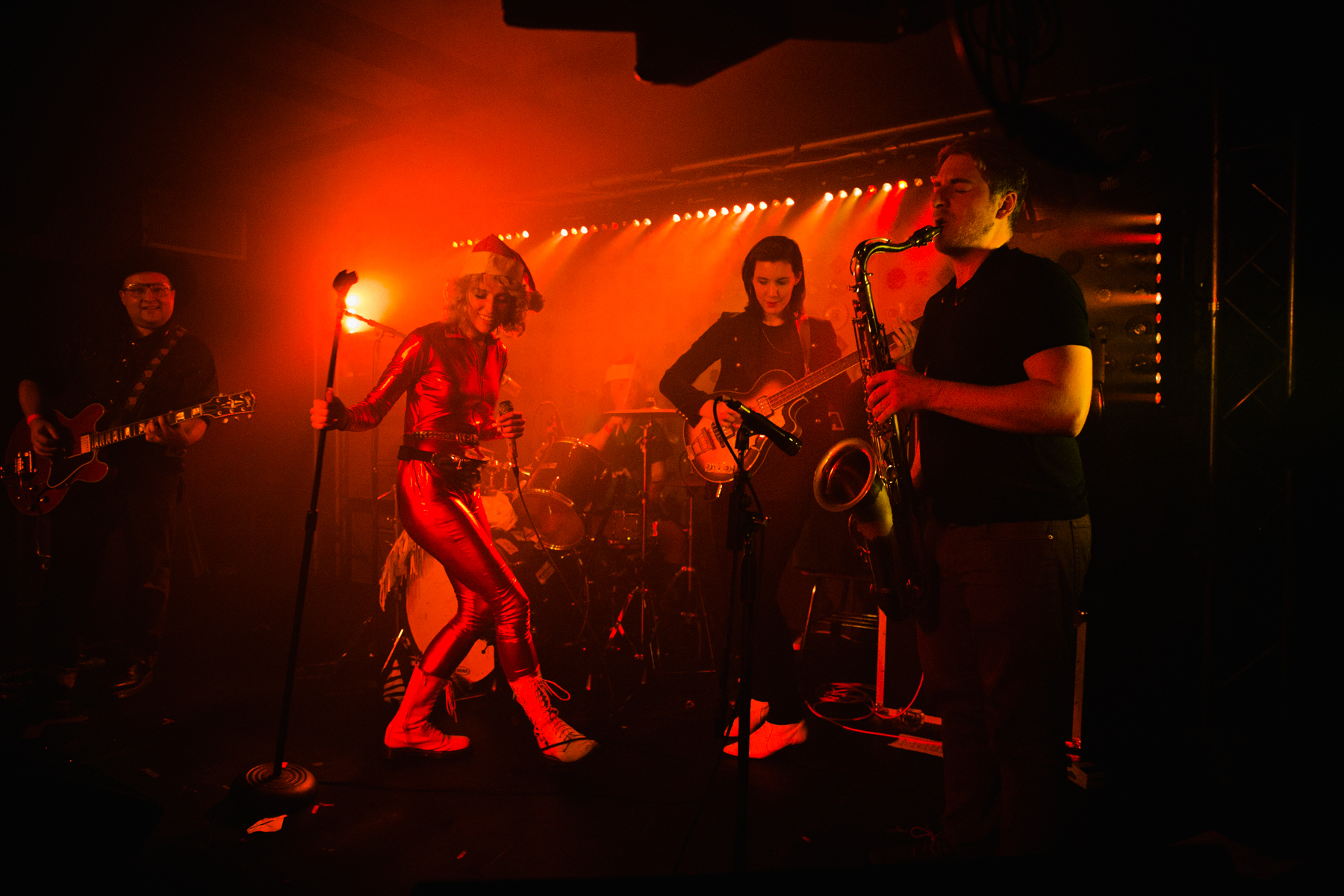Without hearing a single note of their music, at least two members of indie rock band Rilo Kiley should be somewhat recognizable to virtually anyone in the United States who came of age in the '80s or '90s. Jenny Lewis, the group's primary singer and songwriter, began her career in the entertainment industry as a child, appearing as an actress in television shows like Life With Lucy, The New Twilight Zone, Baywatch, The Golden Girls, Growing Pains, and Roseanne. She also appeared on the big screen, acting alongside stars such as Shelley Long in Troop Beverly Hills, Fred and Ben Savage in The Wizard, and Reese Witherspoon in Pleasantville. Guitarist Blake Sennett, meanwhile, had supporting roles as Ronnie Pinsky on Salute Your Shorts, and Joey The Rat on Boy Meets World.
Rilo Kiley is no Dogstar, however. Lewis is a singular talent capable of incisive lyrics and fierce vocal stylings; Sennett's deft guitar playing is stirring; Pierre de Reeder's bass playing is melodic and unobtrusive; and Jason Boesel's drumming is alternately understated and thunderous.
Despite the remarkable gifts of the individual band members, the sum of Rilo Kiley was always greater than its parts. This first became evident in 2003 and 2004, when both Lewis and Sennett -- who had dated for several years before breaking up in 2001 -- stepped outside of their main band and embarked on side projects. Lewis provided background vocals and played keyboards on the Postal Service's seminal Give Up. Sennett started a band called the Elected and released an album titled Me First. While both projects, particularly the Postal Service, proved successful -- commercially, artistically, or both -- Lewis and Sennett each ended up being overshadowed in their new roles, Lewis by Postal Service frontman Ben Gibbard and Sennett by Lewis and her new band.
When Rilo Kiley reconvened and released More Adventurous in 2004, everything appeared to be back to normal. With Lewis front and center, her lyrics and voice as sharp as ever, and Sennett back as co-composer and de facto bandleader, the group experienced its greatest critical and commercial success to date, entering the U.S. Billboard charts for the first time and landing on numerous year-end best-of lists.
On January 24, 2006, Jenny Lewis released her debut solo album, Rabbit Fur Coat, on Conor Oberst's Team Love record label. The deeply personal album showcased her songwriting chops like never before. The tantalizing effort -- replete with brutally honest, first-person narrative lyrics, sparse acoustic arrangements, and lush vocal harmonies provided by the Watson Twins -- garnered Lewis the kind of critical acclaim and commercial success that she had yet to achieve with Rilo Kiley.
Sennett put out his second Elected record, Sun, Sun, Sun, on the very same day that Rabbit Fur Coat was released. An equally powerful work, the record teems with love and optimism. Sun, Sun, Sun is not without its negative moments, however. "The Bank And Trust," for example, contains a thinly veiled account of Sennett and Lewis's dysfunctional personal and working relationship. In it, the singer croons, "She said, 'The only way you got as far as you did is 'cause of me / Your songs suck.'"
Rilo Kiley never recovered. Whether Lewis's success as a solo artist or Sennett's revealing lyrics attributed to the band's eventual demise is pure speculation, but when the group reunited, releasing Under The Blacklight in 2007, that ineffable quality that once made the band special was noticeably absent. The album contained too many overt allusions to sexual depravity, and the overwhelming disco-soul vibe, while creative, came off as contrived, tacky, and sterile. The record isn't all bad. "Silver Lining" and "Breakin' Up," for example, feature strong vocal performances and clever wordplay from Lewis. The title track along with album closer "Give a Little Love" are also pleasant enough. Too frequently, however, the songs on Under The Blacklight tend to meander, ending abruptly and leaving listeners with the same feeling they get when the album finally concludes: a lack of fulfillment.
Three years after the release of Under The Blacklight, Jason Boesel stated in a 2010 interview with Paste that Rilo Kiley was on hiatus. A year later, in an interview with Consequence Of Sound, Sennett declared the band dead. While Jenny Lewis recently proclaimed to BuzzFeed that the band never broke up, it seems unlikely that Rilo Kiley will reconvene to record new material anytime soon. Either way, with a rarities compilation, RKives, slated for release in early April, this appears to be an opportune time to rank and discuss Rilo Kiley's 10 best songs.
10. "Glendora" (from Rilo Kiley/The Initial Friend E.P., 1999/2000/2001)
Rilo Kiley's self-titled debut E.P. was first released independently in 1999. In the subsequent two years, it was re-pressed twice with slightly altered tracklists, artwork, and titles. The songs that comprise Rilo Kiley and The Initial Friend E.P. are not exactly brilliant, but demonstrate great potential and a precociousness that's elusive on most bands' debuts. Two of the better tracks on the release, "Frug" and "Papillion," are generally playful in nature, with humorous lyrical references to Jenny's dance moves, the edibility of gorillas, and the sounds of female orgasm. Humor is fine, but the best way for an artist to endear herself to an audience is by exposing her vulnerabilities. On "Glendora," the album's finest track, Lewis accomplishes this, buoyantly singing her lyrics as if animatedly reading aloud from a diary entry, one in which she repeatedly mentions being taken advantage of by a male paramour. With the performance, she endears herself to any woman who has ever believed she's been mistreated by a man (i.e., every woman). Guys, on the other hand, were hooked for another reason: Lewis remarking, "Would you fuck me?/ 'Cause I'd fuck me" in the song's opening verse.
[videoembed size="full_width" alignment="center"][/videoembed]
9. "I Never" (from More Adventurous, 2004)
For longtime fans of Rilo Kiley, it was interesting to see how the band was marketed following the release of More Adventurous, the group's major label debut. Perhaps unsurprisingly, Lewis was often singled out in magazines and other media for her sex appeal, and the most ubiquitous story from this period involved Lewis recording the vocal to "I Never" nude in the studio. Whether or not the stark-naked performance had any impact on the track's completed vocal, the singer's delivery of the tune's verses is exquisite. Lewis, channeling '60s country-soul icon Dusty Springfield, flawlessly reflects the range of emotions expressed in the song's lyrics, alternately conveying her insecurities in a hushed tone and communicating her gratitude and pledge of allegiance in a fervent roar. The band, meanwhile, matches the singer's intensity, providing muted keyboard chords and plaintive slide guitar during the song's quieter moments, and classical-sounding strings and rousing electric guitar solos during its louder moments.
8. "Science Vs. Romance" (from Take Offs And Landings, 2001)
If Rilo Kiley/The Initial Friend E.P. demonstrated the band's promise, debut full-length album Take Offs And Landings signified the moment when the group began reaching its potential. Rilo Kiley's maturation as songwriters and musicians is apparent from the first note of Take Offs And Landings. Sennett's finger-picking guitar playing on "Go Ahead" is melodic and purposeful, while Lewis's dulcet voice, which impatiently appears mere seconds after her guitarist plucks his first string, paints a poignant picture of a lover who's either absurdly thoughtful or slyly facetious. The singer's magnanimity soon vanishes, however. Beginning with the album's second track, "Science Vs. Romance," Lewis grows more introspective, focusing on matters such as death and loneliness. She's paranoid and anxious. Crash and test sites keep her up at night. Her chief concern, though, at least momentarily, is mechanical detachment. "We're not robots inside a grid," she declares adamantly above a dreamy indie pop backdrop that includes one of Sennett's finest early guitar solos. To ensure her message is delivered, she clarifies her statement in a language more suitable for her ostensibly machine-like mate: binary code. "Zeroes and ones," she sings at the track's conclusion. It's a clever, amusing, and biting remark reserved for a partner steadfastly committed to the logic of science and averse to the sheer emotional inclination to follow his heart.
7. "Pictures Of Success" (from Take Offs And Landings, 2001)
Lewis spends the majority of Take Offs And Landings documenting her struggle navigating her way through the world. "Pictures Of Success" perfectly encapsulates this recurring theme. The band sets the tone for the nearly seven-minute-long song, which feels half that length, with a wistful guitar riff, a soft and subtle bass line, and a gingerly tapped drum pattern. In her lyrics, Lewis admits to lacking money, direction, and time. She's fed up with her mate and sick of her surroundings. Imagery of black holes and hospitals make their way into her verses. Her grip on life is tenuous as best. She may be alive, but as she would sing on a non-album track years later, "barely."
6. "The Execution Of All Things" (from The Execution Of All Things, 2002)
The title track of the band's best album, "The Execution Of All Things" serves as a mission statement. In it, Lewis describes severing ties with her native California and relocating to Omaha, home of the band's new label, Saddle Creek Records, to "work and exploit the booming music scene." The singer's exploitation comment is largely tongue in cheek; Omaha, after all, provided the group with a new environment full of like-minded musicians who valued artistic integrity over wealth, a far cry from the materialism and pretension so often associated with the Golden State. At the outset of the track, Jenny, in her role as group general, assembles her troops, who adopt a take-no-prisoners approach and proceed to metaphorically execute all that lie in their path. "Let's start with the bears and the air and mountains, rivers, and streams," Lewis directs. "Then we'll murder what matters to you and move on to your neighbors and kids." This woman means business. By track's end, the narrative finds the singer facing off with a former flame. "It's just you and me," she intones in a manner that is at once hauntingly beautiful and terrifying. If the eerie sound of Lewis' voice is any indication of what's in store for this guy, he doesn't stand a chance.
5. "My Slumbering Heart" (from The Execution Of All Things, 2002)
The Execution Of All Things contains a number of Rilo Kiley's strongest performances as a band. This, combined with the tracks' often unpredictable structures and inventive musical arrangements, makes for a particularly interesting listening experience. The dynamic "My Slumbering Heart," one of the more remarkable tracks on The Execution Of All Things, typifies the group's solid musicality and creativity during this period. Beginning with a series of metronomic keyboard notes, the song transitions into a thoughtful piece defined by lush synthesizer chords before launching into a jaunty, staccato-filled pop-rock number. The track takes an unexpected turn heading into its bridge, which is preceded by relatively subdued keyboard and guitar interplay. At that moment, it's as if a switch is flipped, and a moving, emotionally charged guitar solo bursts forth from Blake's amplifier. Boesel, meanwhile, attacks his drum kit with reckless abandon. Even Reeder, who's normally as cool as the Alaskan climate to which Lewis so frequently alludes on the album, is particularly animated. At the heart of any great Rilo Kiley song, however, are Jenny and/or Blake's lyrics. "My Slumbering Heart" is no exception. While the bulk of the track recounts Lewis's imaginative nocturnal visions, the climax of the song occurs when the singer focuses on the euphoria she feels while fully conscious. "And it just feels good when you're waking up/ And it just feels good when you're next to me/ And it just feels good when you're coming home," she sings, harmonizing with her guitarist. True companionship often has that kind of effect on people.
4. "Does He Love You?" (from More Adventurous, 2004)
The topics broached on Rilo Kiley's More Adventurous suggest full-fledged adulthood. The introspective lyrics so pervasive on the group's earlier albums remain, but Lewis and Sennett exhibit a far greater awareness of the world around them. The personal specificity in the group's songs is bolstered by subject matter more relevant to a wider audience, including politics and the untimely death of loved ones. Album opener "It's A Hit" partially serves as a pointed criticism of George W. Bush's mishandling of the wars in Afghanistan and Iraq. Two of the tracks, Blake's "Ripchord" and Jenny's "It Just Is," allegedly deal with the suicide of Elliott Smith. Romantic relationships are also explored in a more sophisticated manner. "Does He Love You?," for example, is not merely a breakup song, but a statement on the complexities of an adult relationship. The themes of extramarital affairs, divorce, children, independence, and unmet expectations are covered in a series of verses that read more like prose than song lyrics. Lewis's dialogue is so resonant, her descriptions so vivid, that it's easy to imagine the events depicted in the track as a short story or a film, with Jenny serving double duty as both the narrator and a character. Her band, meanwhile, holds nothing back, utilizing a mellotron, banjo, woodwinds, strings, and other instruments to create a worthy cinematic score.
3. "A Better Son/Daughter" (from The Execution Of All Things, 2002)
Take Offs And Landings Jenny, the one on the brink of an emotional breakdown, seems stable compared to The Execution Of All Things Jenny. In "A Better Son/Daughter," Lewis is so unstable, in fact, that she's taken to staying in bed as an alternative to facing the world, claiming to be petrified to the point of paralysis. Fortunately, the singer is wiser now than she once was, and despite her obvious bout with depression, she's able to face her fears thanks to an inspiring and impeccable verse of encouragement. "You'll fight and you'll make it through/ You'll fake it if you have to/ And you'll show up for work with a smile," she tells herself. Lewis's backing band discovers its strength at the exact same moment that she does. Evocative of a traditional Irish or Scottish ballad -- its swelling, drone-like keyboard bearing a strong resemblance to bagpipes -- the music of "A Better Son/Daughter" takes off at the 1:39 mark. The marching drumbeat that underscores the waltz explodes, the bass drum particularly gargantuan. Lewis's voice -- previously frail, drenched in a lo-fi vocal effect, and buried in the mix -- is now loud and to the fore. She sings with a revitalized energy about being smarter, more grown up, a better daughter and friend, alert, positive, a good listener, honest, brave, beautiful, and happy. It's not as if she's simply risen from her bed. She's come back to life.
2. "With Arms Outstretched" (from The Execution Of All Things, 2002)
"With Arms Outstretched" may be one of the simplest songs of Rilo Kiley's career, but its effect is undeniable. Composed of a basic musical arrangement of acoustic guitar, glockenspiel, and, for added texture, what sounds like an accordion, the song is enhanced by Lewis's bold lyrics and an infectious sing-along chorus. The singer's verses read like a carpe diem poem, one in which she eschews the romantic notion of patiently waiting on a potential suitor to make a commitment to her in favor of providing her not-yet partner with an ultimatum. "And if you want me/ You better speak up/ I won't wait," she sings. It's a far cry from when she was resigned to waiting "a long, long time" in "Capturing Moods" earlier on The Execution Of All Things. When the male choir -- Sennett, Boesel, Bright Eyes' Conor Oberst, and producer Mike Mogis's brother A.J. -- joins Lewis in the latter half of the track, shouting lyrics and clapping their hands, the lead singer appears emboldened, and the urgency of her message sounds as convincing as ever.
1. "Portions For Foxes" (from More Adventurous, 2004)
The single most satisfying aspect of Rilo Kiley's jump to the major label ranks was that the band refused to compromise the integrity of its music to achieve mass appeal. Their recording budget increased, so the production on More Adventurous sounded sleeker, but the essence of their material remained the same. Moreover, the evolution of the band's music seemed organic. With each album, they gradually progressed as songwriters and musicians. "Portions For Foxes," the group's debut single from More Adventurous, proved this. Six years and four records into their career, they recorded their best song. Beginning with four measures of wistful guitar harmonics, "Portions For Foxes" develops into a full-on new wave/power pop frenzy with upbeat rhythmic guitar playing, a chugging bass line, and forceful drumming. Sennett plays a variety of melodic lead guitar licks between and under the verses, each one more creative than the last, as if he had been saving them all for a rainy day. Lewis's lyrics, which explore the conflicted feelings she has about hooking up with a guy she considers "bad news," solidify the song as an anthem for anyone who's ever experienced a similar situation. Her opening line, "There's blood in my mouth 'cause I've been biting my tongue all week," is one of the more brilliant initial lyrics of a pop single in recent memory. Even more impressive is the fact that she sustains this high lyrical quality throughout virtually the entire song. When all is said and done, with Jenny singing the track's final line -- "You're bad news/ I don't care, I like you" -- it's nearly impossible to get Rilo Kiley's "Portions For Foxes" out of your head, and extremely difficult to consider any other composition as the band's best song.















